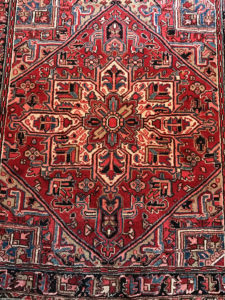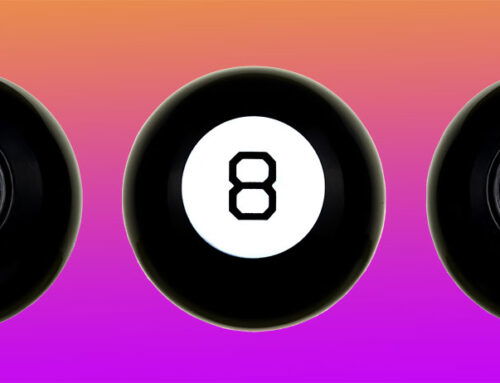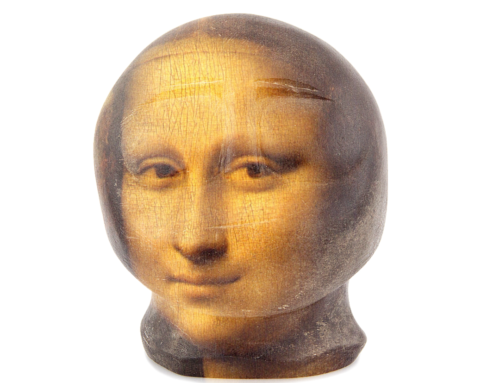My wife Lona protects me at social gatherings from my mild prosopagnosia – difficulty in recognizing faces – by greeting friends and acquaintances by their name as soon as we meet them. I’m often uncertain of someone’s identity, even if I know him or her rather well, especially when they cross my path out of context, or if they had a haircut or put on glasses.

Heriz Persian Rug, circa 1920
When someone comes up to me in a group with a big smile and says, “Joram, it’s so good to see you again,” I reciprocate.
“Great to see you too!” I say, feigning great pleasure.
I shake their hand, but am uncertain who the heck the person is. I never mention a name, even if I think I might know the person’s identity. I fake it until hopefully I receive a clue, and what a relief that is! An especially embarrassing moment came when I asked my son’s friend at college what her name was after I’d spent the whole evening at dinner the day before speaking to her. I had no idea who she was the next morning when she was in a sweatshirt and wearing eyeglasses. It took me some time to live that down!
Psychologists say a pretty face depends on symmetry, but that’s not much help. I try to look for a specific characteristic of a person’s face when I first meet them, perhaps one eye is slightly higher than the other, or a dimple marks one cheek. I confess this seldom works. There are too many people in too many places too much of the time. I struggle to recognize people, unless they have some obvious flaw, thank goodness. A flaw that allows me to recognize someone can be looks, or manner of speech, or dress, or something else that impresses me.
So for me, a flaw has the silver lining of identifying a person. The cliché that we are loved for our endearing imperfections (unfortunately not all of our imperfections) also has some truth, adding glitter to flaw’s silver lining.
But the astounding effect of flaws – imperfections – concerns importance in creativity.
Persian rugs exemplify the positive effect of imperfections. Look carefully at repeated design themes in a village rug and you’ll find many non-symmetrical, imperfect matches, a clear sign that it was handmade. Would you prefer perfect matches and precise symmetry made by a machine? The imperfections raise the rug from the floor to the lofty heights of art, made by humans, not mass-produced by a machine. No two hand-made Persian rugs are identical; the small flaws, seldom even noticed at first glance, add to the creativity of each.
Similarly, it’s the tragic flaws of King Lear (arrogance, ignorance, misjudgments) and Othello (pride, gullibility, jealousy) that bring their downfall, are remembered, and make these Shakespeare characters immortal. The anti-hero Ignatius J. Reilly in John Kennedy Toole’s A Confederacy of Dunces is a lovable sloth that becomes an unforgettable personality due to more character flaws than I can list here. Or, consider the irreplaceable, valiant Don Quixote in his suit of shining armor vanquishing a windmill and unable to distinguish simple truth from his private ideal world. Wouldn’t he look ridiculous in a coat and tie and carrying a briefcase to the office? Even Mozart understood the power of imperfection when he composed Ein musikalischer Spass (A Musical Joke), filled with absurd sounds, wrong notes, unorthodox scales, lopsided musical phrases and more, which I heard performed in concert for the first time last week. The program speculated that Mozart used the power of flaws to poke fun at someone or something.
Mistakes have played a major role in scientific advances as well. Johannes Kepler’s biographers have called the great mathematical astronomer “the sleepwalker” for deriving the elliptical planetary orbits despite carrying a small mathematical error throughout his complex calculations. In fact, a plethora of important scientific discoveries were made accidentally.
So don’t obsess about reaching perfection (despite the futility) as you strive to create a masterpiece, whatever the medium. Try your best, of course, to do a good job. But the flaws in design, characters, and execution may be the most important contributions you make, whether intended or not. It’s not only brilliance (although that helps), or luck (although that’s absolutely essential), or destiny (which is too fickle to consider seriously).
Creativity is a mercurial beast, filled with flaws that turn demons to angels, sometimes, if you’re lucky.






Leave A Comment